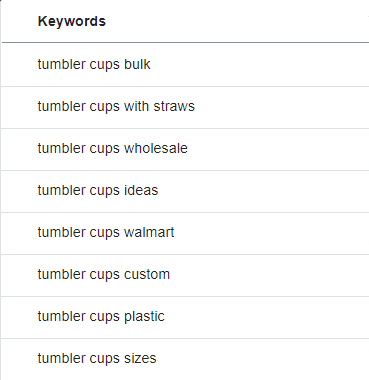-
 9 min. read
9 min. read
-
 Macy Storm
Macy Storm Content Marketing Consultant
Content Marketing Consultant
- Macy is a content marketing consultant with over five years of experience creating content for dozens of industries including home services, recreation, and education. She’s written about every marketing topic under the sun, from SEO to AI to email marketing. Her work has been featured by Search Engine Journal, HubSpot, Entrepreneur, Clutch, and more. In her free time, Macy enjoys crafting, reading comic books, and walking her dog Daisy.
When you launch a pay-per-click (PPC) campaign through Google Ads, you’re eager to start reaching people most interested in your business. Likely, your first step is to conduct keyword research to find every relevant keyword your audience may search to find your product or service. After using a keyword research tool, you’ll soon find yourself with over 100 keywords.
Google has a 20,000 target items per ad group limit, so targeting 100 keywords isn’t a big deal. Right? Well, think again.
In this post, we’ll answer your burning questions like:
- How many keywords per ad group should I use?
- Why don’t I want to have too many keywords?
- How do I find the right keyword amount?
P.S. Sign up for our email list to get the latest tips and tricks on how to improve your marketing campaigns!
How many keywords per ad group should I use?
If you’ve landed on this page, you’re likely wondering, “how many keywords should I use per ad group?” The general rule of thumb is less than 30, but there is no precise answer. You’ll hear recommendations of 20-25 keywords, but those numbers aren’t accurate for every business. While it’s okay for you to have 20-25 keywords for every ad, you don’t have to reach that amount for a successful campaign.
Overall, the number of keywords you should use per ad group will depend upon your ad content, who you’re targeting, and what keywords your target audience searches. You also need to consider the quality of the keywords with keyword advertising. Quality will always outweigh quantity.
You’re better off targeting 10 high-quality keywords in your ad than 50 low-quality keywords. So, your “perfect” amount will fluctuate with each ad you run.
4 reasons you don’t want to target too many keywords
So, you asked, “how many keywords per ad group can I use?” and got an answer of less than 30. If you wondered how many keywords are too many keywords, you might feel stumped after hearing “anything over 30.” After all, Google Ads keyword targeting is a maximum of 20,000 items, so why not use more? Here are four reasons you don’t want to target more than 30 keywords for your Google Ads campaigns.
1. Your daily budget isn’t big enough
When you’re running PPC ads, you typically set a daily budget for your ads so you don’t eat up your overall budget at once. Daily limits ensure that you spread your budget out over a few days, weeks, or months so you can reach more people over time. So, let’s say your daily PPC budget is $40 and your cost-per-click (CPC) for every keyword is $1. If you target 20 keywords, you can generate 40 clicks per day. You could get two clicks per keyword for each of your keywords (in a homogenous world). So, overall, your daily budget has wiggle room for each keyword to take a piece of your budget.
Now, imagine you go on a keyword research spree and find 30 new terms for your ad. You really like all of them and can’t decide which ones to include, so you use all of them. Now, suddenly, you have 50 key terms fighting over a $40 budget.
Based on this information, not every keyword could get at least one click because your daily budget amount is less than the keywords you’re targeting. So now, your daily budget can’t support your keyword list. That means you may run an ad that drives no traffic because your other ads eat up the daily budget.
It doesn’t mean those keywords aren’t valuable to your business, but rather, there are too many competing keywords to see the actual value. Not to mention, it will hurt ad performance because you can’t run your ads, which leads to our next reason.
2. Your campaigns will stop running when you max out your daily budget
When you launch a PPC ad and set a maximum daily budget, your ad stops running once you’ve used all that budget. Your campaigns turn off until the next day, when you have a new daily budget. You won’t increase brand exposure, drive traffic to your site, or earn conversions.
Not to mention, if your campaigns aren’t running, it can hurt your keyword performance. First, your high performing keywords won’t drive the traffic that they typically drive. These keywords share more of your budget, which means there is less room for that keyword to drive clicks.
So, as a result, you may miss out on some highly-qualified leads. Second, your high performing keywords may not be able to reach people at the right time. If you know your high-performing keywords drive the most traffic around noon, but your budget gets eaten up by 9, those keywords won’t get the chance to drive the valuable traffic you desire.
As a result, your PPC campaigns may suffer because your keywords don’t have an adequate budget to maximize performance.
3. You may not be able to identify underperforming keywords
If you have dozens of terms for each of your ad campaigns, it’s going to be challenging to determine which keywords are underperforming. Go back to our example where you have a $40 budget and 50 keywords. If you have a few keywords that never get a piece of the budget, does that mean they aren’t valuable to your business?
No, not necessarily. It just means there isn’t room for those keywords to truly perform to see if they’re valuable to your business. On the other hand, having a $40 daily budget with 10 keywords creates more wiggle room to see keyword performance.
So, if you use too many keywords, you won’t be able to nix less relevant keywords from your ad campaign.
4. It takes work to manage a lot of keywords
When you have more keywords, you have more work for your business. It takes a lot of work to manage 50 keywords for one campaign — now imagine you’re running five PPC campaigns! Imagine trying to monitor and optimize 250 keywords for your PPC campaigns.
It’s an overwhelming task to analyze these keywords to ensure they’re all working to help your business drive valuable traffic and leads. But that’s not all you’re managing, either. You must monitor:
- Your ad copy to ensure it’s relevant and working for your audience
- Your negative keywords to ensure they’re working and that you have all the ones your need
- Your budget to ensure you’re making the most of it
When you add these responsibilities to your daily business routine, it’s easy to become overwhelmed. In the end, by adding more keywords to your PPC ads, you’re putting more tasks on your plate than you would if you targeted fewer keywords.
We foster and form long-term partnerships so that your business has long-term results.
Over 90%
How to find the right number of keywords for your ad groups
You now know how many keywords are too many to target.
You know how many keywords per ad group you should use. But you’re still feeling unsure about how many keywords you should use for your ad copy. While there is no solidified or correct number under 30, here are two ways you can find the right number of keywords for your business.
Focus on the quality rather than the quantity
Finding the right keywords isn’t about how many you can find, but rather how valuable they are to your business.
Instead of focusing on hitting a certain keyword amount, focus instead on implementing high-quality keywords. Use a keyword research tool like KeywordsFX to find relevant terms. When you generate your list of terms, focus on long-tail keywords.
 Long-tail keywords contain three or more words, like “purple insulated tumbler cup.” Long-tail keywords add more value to your PPC campaigns because they drive more qualified traffic. If someone searches “purple insulated tumbler cup,” you know exactly what they want, and if you offer that product, you fit their search query. Not to mention, these keywords have less competition since they’re so specific, which means a lower CPC for your business.
Long-tail keywords contain three or more words, like “purple insulated tumbler cup.” Long-tail keywords add more value to your PPC campaigns because they drive more qualified traffic. If someone searches “purple insulated tumbler cup,” you know exactly what they want, and if you offer that product, you fit their search query. Not to mention, these keywords have less competition since they’re so specific, which means a lower CPC for your business.
Having a lower CPC enables you to get more clicks with your budget. On the other hand, a keyword like “tumbler” won’t drive the best traffic for your ad. These keywords are short and highly competitive, meaning you’ll have more competition and pay more to get less relevant leads.
Stick to long-tail keywords, and you’ll drive better results with your ad. Again, don’t focus on reaching a specific number of keywords, but rather, focus on the quality of the keywords. An ad with five high-quality, highly relevant keywords will perform significantly better than an ad with 30 mediocre keyword selections.
Don’t treat all campaigns the same
A common mistake companies make is treating all their PPC campaigns the same.
Just because 15 keywords work great for one ad campaign doesn’t mean it will work for every future campaign you run. Each of your campaigns is unique and attracts searchers differently. You may launch a new campaign and find that 15 keywords are too many for that particular ad!
Every campaign is unique, so don’t be surprised if every new campaign uses more or fewer keywords than the previous campaign. Again, focusing on the quality rather than the quantity for each campaign will help you drive the best results!
Good agencies have more than 50 testimonials.
Great agencies have more than 100 testimonials.
WebFX has over 1,100+ glowing client testimonials.
See What Makes Us Stand out

Let WebFX help you figure out how many keywords to use per ad group
Finding the right keywords can impact your ad’s performance now and beyond. If you want to get the most from your PPC campaign, you need to optimize your campaigns to target the right keywords and drive relevant traffic to your site.
At WebFX, we have over 29 years of experience running PPC campaigns that drive results. We’ve managed over 650 PPC campaigns and driven over $10 billion in sales for our clients in the past five years alone. You can feel confident that we have the experience to drive results for your company.
Ready to get expert help with your PPC campaigns? Contact us online or call us today at 888-601-5359 to speak with a strategist about our PPC services!
-
 Macy is a content marketing consultant with over five years of experience creating content for dozens of industries including home services, recreation, and education. She’s written about every marketing topic under the sun, from SEO to AI to email marketing. Her work has been featured by Search Engine Journal, HubSpot, Entrepreneur, Clutch, and more. In her free time, Macy enjoys crafting, reading comic books, and walking her dog Daisy.
Macy is a content marketing consultant with over five years of experience creating content for dozens of industries including home services, recreation, and education. She’s written about every marketing topic under the sun, from SEO to AI to email marketing. Her work has been featured by Search Engine Journal, HubSpot, Entrepreneur, Clutch, and more. In her free time, Macy enjoys crafting, reading comic books, and walking her dog Daisy. -

WebFX is a full-service marketing agency with 1,100+ client reviews and a 4.9-star rating on Clutch! Find out how our expert team and revenue-accelerating tech can drive results for you! Learn more
Try our free Marketing Calculator
Craft a tailored online marketing strategy! Utilize our free Internet marketing calculator for a custom plan based on your location, reach, timeframe, and budget.
Plan Your Marketing Budget

Proven Marketing Strategies

Proven Marketing Strategies
Try our free Marketing Calculator
Craft a tailored online marketing strategy! Utilize our free Internet marketing calculator for a custom plan based on your location, reach, timeframe, and budget.
Plan Your Marketing Budget
What to read next




